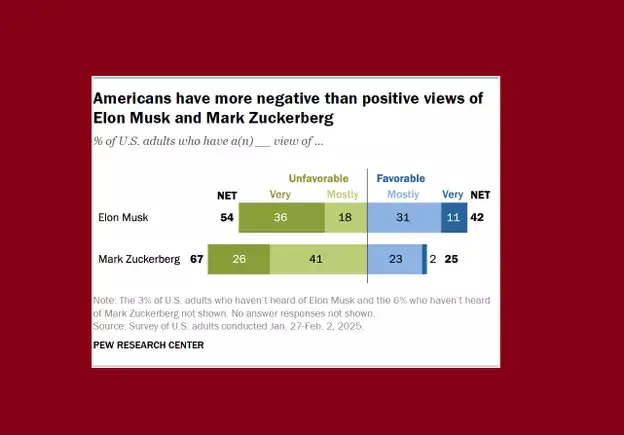In recent years, the attitudes of Americans toward influential tech personalities like Elon Musk and Mark Zuckerberg have experienced a noticeable shift. This change is evident from the findings of a Pew Research survey conducted between January 27 and February 2, 2025, which revealed significant discontent among the American populace. According to the results, 54% of U.S. adults viewed Musk unfavorably, with a striking 36% expressing very unfavorable opinions. In contrast, Zuckerberg faced even harsher judgment, as a staggering two-thirds of respondents described their perceptions of him negatively, and 26% of those held extremely adverse views.
This data not only highlights a general disenchantment with these tech giants but also poses critical questions about the factors contributing to their declining approval ratings. While Musk has his fair share of critics, the sheer volume of animosity directed towards Zuckerberg suggests that his actions—ranging from data privacy controversies to handling teenage welfare—have struck a nerve with the public.
Both Musk and Zuckerberg have faced mounting scrutiny in recent months, largely due to their increasing involvement in contentious political discourse and their business practices that many have deemed ethically questionable. Musk has attracted controversy with his bold statements and decisions that sometimes seem to prioritize personal or political ambition over social responsibility. Notably, his public disputes with family members, legal battles against detractors, and transforming Twitter into a personal platform have only fueled public disdain.
Similarly, Zuckerberg’s image has suffered due to accusations surrounding his handling of user data, especially given recent discussions about privacy regulations and their effects. The controversial nature of some apps popularized under his leadership, particularly those that potentially harm younger users, adds to the growing perception that he prioritizes growth over user welfare. Furthermore, his land acquisitions in Hawaii have not only drawn attention but also angered locals, contributing to the tarnished image he now holds.
Both individuals are remarkable for their immense wealth and power, and with that comes a heightened level of scrutiny. Critics argue that such wealth can lead to a disconnect from reality, with billionaires like Musk and Zuckerberg becoming increasingly out of touch with the needs and sentiments of everyday Americans. This sense of alienation ignites public backlash, especially as ambitious maneuvers—whether in business strategy or public opinion—adversely affect a significant portion of the population.
What’s more, their refusal to welcome regulatory oversight reflects a concerning trend in the tech world. While it’s understandable that they desire to streamline their operations and expand their influence, the absence of checks and balances raises ethical red flags. Regulations designed to protect consumers and maintain fair markets are seen as impediments to personal freedom and entrepreneurial spirit, but unregulated power can lead to adverse community impacts. The prevailing sentiment seems to suggest that both Zuckerberg and Musk are deeply absorbed in their ambitions, often disregarding the broader implications of their decisions.
As public sentiment continues to wane, it prompts the question of how history will remember these leaders—will they be lauded as geniuses who drove innovation, or vilified for their disregard of societal impacts? Both outcomes could be true, reflecting the complex nature of progress in the tech industry. They corridor treads of inspiring accomplishments alongside significant ethical missteps, making it vital to maintain scrutiny over their actions.
As they pursue their grand visions, it’s essential for society to advocate for accountability and the establishment of boundaries that prioritize public welfare over unrestrained ambition. This dynamic interplay between power and responsibility will likely shape the future landscape of technology and governance in ways we are only beginning to comprehend.
Ultimately, the evolving perception of Musk and Zuckerberg serves as a stark reminder of the inherent responsibility carried by those who wield enormous influence, and the need for steadfast ethical standards that align with the community lifestyle—because unchecked power seldom leads to positive outcomes.


Leave a Reply